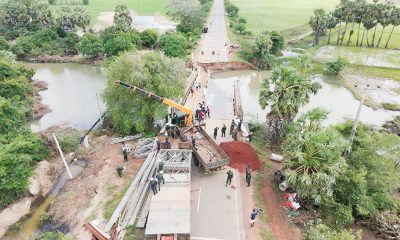News
Opposition boycotts President’s tea party, barring Eran and Welgama

Opposition MPs, except SJB MPs Eran Wickremaratne and Kumara Welgama, boycotted the tea party hosted by President Gotabaya Rajapaksa after delivering his presidential policy statement in Parliament yesterday.
Opposition party members did not attend the party held at the Parliament restaurant as a sign of protest against the President, an opposition MP said. He said that many other opposition MPs proposed to boycott the event while others suggested that they should all dress in black but several leaders argued that they should be present in the House to respect the tradition. “We respected the tradition, not the man. Some of those who proposed did not attend the session,” the opposition MP said.
Around 20 opposition MPs in the opposition ranks were absent, while MP Radhakrishnan was seen wearing a black suit (SI)
News
Lankan aircrew fly daring UN Medevac in hostile conditions in Africa

The Sri Lanka Aviation Unit operating under the United Nations (UN) mandate in the Central African Republic (CAR) has successfully carried out a critical Casualty Evacuation (CASEVAC) mission, under extremely hostile and volatile conditions.
The mission had been launched in response to an urgent request to evacuate two United Nations personnel who had sustained combat-related injuries in the Zemio area, the Sri Lanka Air Force (SLAF) said.
Accordingly, the evacuation has been conducted using a Mi-17 helicopter (UNO 325P).
The aircraft was captained by Wing Commander Nelson De Silva, with Flight
Lieutenant Arunoda Ekanayake serving as co-pilot.
The aircrew comprised Squadron Leader Sandeepa Wijayathunga, Sergeant WCN Senevirathne, and Corporal DVPM Rodrigo. The Aeromedical Evacuation Team included Group Captain Sujith Perera, Flight Sergeant KW Sumedha, and Flight Sergeant RDH Karunadasa, who provided critical in-flight medical care to the casualties, the SLAF stated.
The extraction site was located approximately 20 kilometres northeast of the Zemio Permanent Operating Base (POB) and posed significant operational challenges.
They included extremely dusty landing conditions, an unstable and rapidly evolving tactical environment, and the requirement for a precision landing under constant threat, the SLAF said.
Despite these constraints, the aircrew demonstrated remarkable courage, sound judgement, and outstanding airmanship throughout the operation.
A comprehensive threat assessment conducted by the aircraft commander, taking into account the critical condition of the casualties, reflected exceptional adaptability and operational decision-making, the statement added.
According to the SLAF, the total flight duration of the mission was one hour and 45 minutes. The injured personnel were safely evacuated from the hostile location and successfully transported to Bangui for advanced medical treatment.
News
Lanka to observe National Safety Day today

Sri Lanka will mark National Safety Day today (26) with countrywide religious observances, a national moment of silence and the main state commemoration at the Peraliya Tsunami Memorial in Galle, officials said yesterday.
The annual observance, declared in the aftermath of the 2004 Indian Ocean tsunami that claimed over 35,000 lives and left more than 5,000 people missing, is held each year to honour victims of the tsunami and other disasters, while reinforcing public awareness on disaster preparedness.
Disaster Management Centre (DMC) Director General Retired Major General Sudantha Ranasinghe said the 2025 programme would be conducted with due consideration to prevailing weather conditions caused by the Ditwah cyclone, with district-level multi-religious observances planned across the country.
“National Safety Day is a moment of remembrance and reflection. It also reminds us of the importance of preparedness, early warning and community resilience,” he said.
The main national commemoration will take place at the Peraliya Tsunami Memorial from 8.30 a.m. to 11.00 a.m., with the participation of government representatives, religious leaders, disaster survivors and families of victims.
Secretary to the Ministry of Defence Air Vice Marshal (Retd) Sampath Thuyacontha said a two-minute silence will be observed nationwide from 9.25 am to 9.27 am today, in memory of all those who lost their lives to the tsunami and other disasters.
“All institutions and members of the public are requested to observe this moment of silence as a mark of respect and national solidarity,” he said.
DMC Additional Director General Pradeep Kodippili urged the media to provide wide coverage to the main commemoration in Galle as well as district-level programmes organised through District Secretariats.
“Media support and public participation are essential to ensure that the lessons of past disasters remain alive and that a culture of safety is strengthened across the country,” Kodippili said.
National Safety Day has been observed annually on December 26 since 2005.
By Ifham Nizam ✍️
News
Street vendors banned from Kandy City

All forms of street vending within the Kandy Municipal Council area will be banned from January 1, Mayor Chandrasiri Wijenayake has said.The Kandy Mayor said the decision had been taken as part of efforts to preserve it as a clean and aesthetically pleasing city and to allow the public to move freely while enjoying its surroundings.
He said the ban would apply not only to streets in the city centre but across the entire municipal council area. The move, he added, follows long-standing public requests for a more systematic regulatory framework within the Kandy urban area and is aimed at ensuring public convenience and welfare.
Wijenayake stressed that the decision would be implemented without reversal.
The Kandy Municipal Council has already issued formal notices to pavement vendors directing them to cease operations. Street vendors had requested a three-month grace period to relocate, which will expire on December 31.
By S. K. Samaranayake ✍️
-

 News3 days ago
News3 days agoMembers of Lankan Community in Washington D.C. donates to ‘Rebuilding Sri Lanka’ Flood Relief Fund
-

 Latest News6 days ago
Latest News6 days agoLandslide early warnings issued to the districts of Badulla, Kandy, Kurunegala, Matale and Nuwara-Eliya extended till 8AM on Sunday (21)
-

 News4 days ago
News4 days agoAir quality deteriorating in Sri Lanka
-

 Business5 days ago
Business5 days agoBrowns Investments sells luxury Maldivian resort for USD 57.5 mn.
-

 Editorial6 days ago
Editorial6 days agoCops as whipping boys?
-

 News4 days ago
News4 days agoCardinal urges govt. not to weaken key socio-cultural institutions
-

 Features5 days ago
Features5 days agoAnother Christmas, Another Disaster, Another Recovery Mountain to Climb
-

 Features5 days ago
Features5 days agoHatton Plantations and WNPS PLANT Launch 24 km Riparian Forest Corridor













